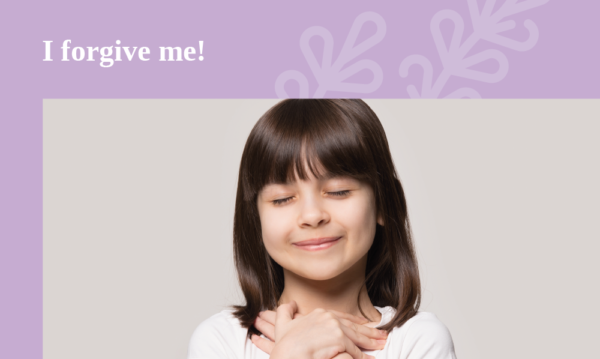We need to accept and love ourselves, just for what it is, if we want to be happy. As important as it is to forgive others, it is also important to forgive ourselves if we want to live in peace and get rid of the past’s pain and sorrows.
Investigating guilt, shame, and doubt about ourselves
If we want to discover the moments and events that have caused feelings of doubt about ourselves, we can try the following exercise. Alternatively, we can use different words, such as guilt, shame, self-rejection, self-doubt, because each of them can create different responses and feelings within us:
Step 1: We record the following phrases and fill them in with what comes to mind:
· I feel guilt, shame, rejection, or doubt for myself when………………………………………………
…………………………………………………………………………………………………………………………………………
· What I would like to hide from others is ………………………………………………………………….
…………………………………………………………………………………………………………………………………………
Step 2: Asking for forgiveness
When we have discovered what prevents us from feeling good about ourselves, we can proceed to the following actions.
1. It is good to make sure first that our action is indeed contrary to the principles of our conscience or that we have done to someone something we would not like others to do to us. (Because there may not be such a thing, and we finally understand how unjustly we feel guilt or self-rejection.)
2. If we believe that we have acted unfairly, we analyze why we operated in this way. We may have felt fear, anger, injustice, pain, or guilt. Some more profound pain or fear has prompted us to behave in a way that we now disapprove of.
3. Once we realize what feelings led us to this behavior, we can analyze what thoughts or beliefs led us to those feelings.
4. Then, we can change these thoughts and beliefs not to feel that way and not conduct the same behaviors that we then repented for. Changing the mental and emotional mechanisms that lead us to actions we disapprove of is real repentance.
5. A good and liberating step is to ask forgiveness from those we hurt.
The resistance to asking for forgiveness
It’s not that easy to admit our mistakes for most of us and apologize, even if we know we’ve been selfish. If we remain attached to our ego and the impression others have of us, we will not move forward. It is good to remember that forgiveness is an experience of self-preservation and has nothing to do with self-pity, self-rejection, or self-punishment.
Our “liberation” will come only with recognizing our wrongs and weaknesses and with the forgiveness of ourselves.
Forgiving ourselves
It is good to keep in mind that we do not need others’ forgiveness, but only the power to apologize; a sincere apology, coming from the heart. If we ask for forgiveness and the other is not yet ready to forgive us, this does not have to be our problem. We have carried out our “duty”; we are liberated and with a clear conscience. The other has the right and the personal will to choose whether to forgive or not.
We can also take any action we deem necessary on a practical level to correct a mistake. We may offer some voluntary work, such as helping the poor, orphans, the blind, the elderly, etc.
Let us also remember some truths:
· Asking for forgiveness doesn’t mean I’m wrong, but that I recognize my ignorance and want to be free of it.
· I love, accept, and appreciate myself as it is.
· I deserve the love and respect of all people, regardless of my appearance, social status, profession, knowledge, background, achievements, and what others think of me.
· My value is the same as the value of all people, neither more nor less.
· No one was born perfect. We all make a lot of mistakes. That’s natural. But it is not right not to forgive ourselves and others for these mistakes.
But let’s keep in mind that these truths exist to free ourselves from guilt, shame, and doubt about the past and not permit us to do what we want in the future. The important thing is to learn from our mistakes and not repeat them.
References:
Holistic Harmony


